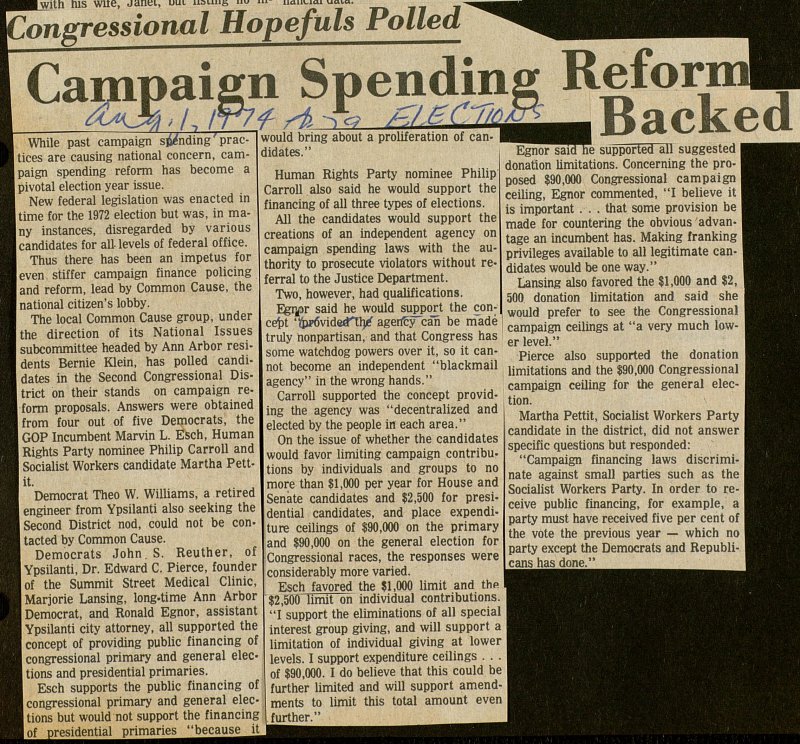Campaign Spending Reform Backed

While past campaign sflénding practices are causing national concern, campaign spending reform has become a pivotal election year issue. New federal legislation was enacted in time for the 1972 election but was, in many instances, disregarded by various candidates for levéis of federal office. Thus there has been an ímpetus for even stiffer campaign finance policing and reform, lead by Common Cause, the national citizen's lobby. The local Common Cause group, under the direction of its National Issues subcommittee headed by Ann Arbor residents Bernie Klein, has polled candidates in the Second Congressional District on their stands on campaign reform proposals. Answers were obtained from four out of five Democrats, the GOP Incumbent Marvin L. Esch, Human Rights Party nominee Philip Carroll and Socialist Workers candidate Martha Pettit. Democrat Theo W. Williams, a reurea engineer from Ypsilanti also seeking the Second District nod, could not be contacted by Common Cause. Democrats John. S. Reuther, of Ypsilanti, Dr. Edward C. Pierce, founder of the Summit Street Medical Clinic, Marjorie Lansing, long-time Ann Arbor Democrat, and Ronald Egnor, assistant Ypsilanti city attorney, all supported the concept of providing public financing of congressional primary and general elections and presidential primaries. Esch supports the public financing of congressional primary and general elec I tions but would not support the financing lof Dresidential primaries "because it would bring about a proliferation of idates." Human Rights Party nominee Philip Carroll also said he would support the financing of all three types of elections. All the candidates would support the creations of an independent agency on campaign spending laws with the authority to prosecute violators without reerral to the Justice Department. Two, however, had qualifications. Efeijpr said he would support the concept 'ifctfóVideínijií ageriÊy can be madé truly honpartisan, and that Congress has some watchdog powers over it, so it cannot become an independent "blackmail agency" in the wrong hands." Carroll supported the concept providing the agency was "decentralized and elected by the people in each area." On the issue of whether the candidates would favor limiting campaign contributions by individuals and groups to no more than $1,000 per year for House and Senáte candidates and $2,500 for dential candidates, and place expendíture ceilings of $90,000 on the primary and $90,000 on the general election for Congressional races, the responses were considerably more varied. Esch favored the $1,000 limit and th $2,500 limit on individual contributions. "I support the eliminations of all special interest group giving, and will support a limitation of individual giving at lower levéis. I support expenditure ceilings . . . of $90,000. I do believe that this could be further limited and will support amendments to limit this total amount even further." Egnor said he süpported all suggested I donatlon limitations. Concerning the proposed $90,000 Congressional campaign ceiling, Egnor commented, "I believe it is important . . . that some provisión be made for countering the obvious advantage an incumbent has. Making franking privileges available to all legitímate candidates would be one way." Lansing also favored the $1,000 and $2, 500 donation limitation and said she would prefer to see the Congressional campaign ceilings at "a very much lower level." Pierce also süpported the donation limitations and the $90,000 Congressional campaign ceiling for the general election. Martha Pettit, Socialist Workers Party candidate in the district, did not answer specific questions but responded: "Campaign financing laws discrimínate against small parties such as the Socialist Workers Party. In order to receive public financing, for example, a party must have received five per cent of the vote the previous year - which no party except the Democrats and Republicans has done."
Article
Subjects
Ann Arbor News
Old News
Socialist Workers Party
Republican Party
Laws & Legislation
Human Rights Party (HRP)
Elections - Candidates
Democratic Party
Common Cause
Campaigns
Ann Arbor - Elections
Theo W. Williams
Ronald Egnor
Phillip Carroll
Marvin L. Esch
Martha Pettit
Marjorie Lansing
John S. Reuther
Edward C. Pierce
Bernie Klein